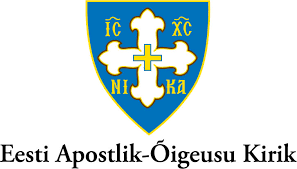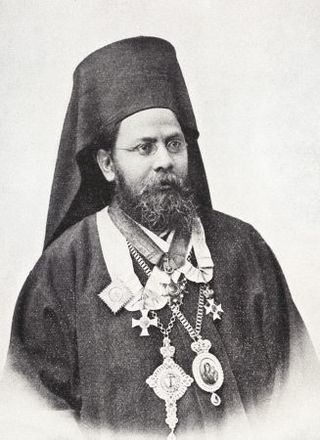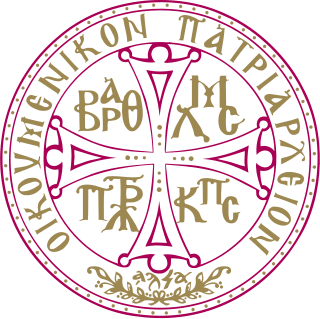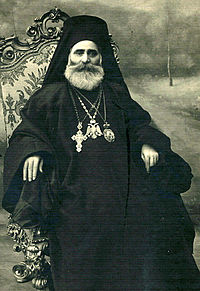An ecumenical council, also called general council, is a meeting of bishops and other church authorities to consider and rule on questions of Christian doctrine, administration, discipline, and other matters in which those entitled to vote are convoked from the whole world (oikoumene) and which secures the approbation of the whole Church.

The Eastern Orthodox Church, also called the Orthodox Church, Greek Orthodox Church, or officially the Orthodox Catholic Church, is the second-largest Christian church, with approximately 220 million baptised members. It operates as a communion of autocephalous churches, each governed by its bishops via local synods. The church has no central doctrinal or governmental authority analogous to the head of the Catholic Church. Nevertheless, the Ecumenical Patriarch of Constantinople is recognised by them as primus inter pares, a title formerly given to the patriarch of Rome. As one of the oldest surviving religious institutions in the world, the Eastern Orthodox Church has played a prominent role in the history and culture of Western Asia, the Caucasus, and Eastern and Southeastern Europe.
The Eastern Orthodox Church, officially the Orthodox Catholic Church, is a communion composed of up to seventeen separate autocephalous (self-governing) hierarchical churches that profess Eastern Orthodoxy and recognise each other as canonical (regular) Eastern Orthodox Christian churches.
The Fourth Council of Constantinople was held in 879–880. It confirmed the reinstatement of Photius I as patriarch of Constantinople.
The Revised Julian calendar, or less formally the new calendar and also known as the Milanković calendar, is a calendar proposed in 1923 by the Serbian scientist Milutin Milanković as a more accurate alternative to both Julian and Gregorian calendars. At the time, the Julian calendar was still in use by all of the Eastern Orthodox Churches and affiliated nations, while the Catholic and Protestant nations were using the Gregorian calendar. Thus, Milanković's aim was to discontinue the divergence between the naming of dates in Eastern and Western churches and nations. It was intended to replace the Julian calendar in Eastern Orthodox Churches and nations. From 1 March 1600 through 28 February 2800, the Revised Julian calendar aligns its dates with the Gregorian calendar, which had been proclaimed in 1582 by Pope Gregory XIII.

The ecumenical patriarch is the archbishop of Constantinople (Istanbul) and New Rome, and primus inter pares among the heads of the several autocephalous churches which compose the Eastern Orthodox Church. The ecumenical patriarch is regarded as the representative and spiritual leader of the Eastern Orthodox Christians worldwide. The term ecumenical in the title is a historical reference to the Ecumene, a Greek designation for the civilised world, i.e. the Roman Empire, and it stems from Canon 28 of the Council of Chalcedon.
Autocephaly is the status of a hierarchical Christian church whose head bishop does not report to any higher-ranking bishop. The term is primarily used in Eastern Orthodox and Oriental Orthodox churches. The status has been compared with that of the churches (provinces) within the Anglican Communion.

Council of Constantinople can refer to the following church councils convened in Constantinople :
Thomas I was the Ecumenical Patriarch of Constantinople from 607 to 610. He has been canonized a saint in the Eastern Orthodox Church. His feast day is 21 March for those churches which follow the Julian Calendar, 21 March falls on 3 April of the modern Gregorian Calendar).
Philotheos Kokkinos was the Ecumenical Patriarch of Constantinople for two periods from November 1353 to 1354 and 1364 to 1376, and a leader of the Byzantine monastic and religious revival in the 14th century. His numerous theological, liturgical, and canonical works received wide circulation not only in Byzantium but throughout the Slavic Orthodox world.

The Estonian Apostolic Orthodox Church is an Orthodox church in Estonia under the direct jurisdiction of the Ecumenical Patriarch of Constantinople. Under Estonian law it is the legal successor to the pre–World War II Estonian Orthodox Church, which in 1940 had over 210,000 faithful, three bishops, 156 parishes, 131 priests, 19 deacons, two monasteries, and a theological seminary; the majority of the faithful were ethnic Estonians. Its official name is the Orthodox Church of Estonia.

Photius served as Greek Patriarch of Alexandria between 1900 and 1925. He opposed reform to change from the Julian calendar to the Gregorian calendar. He died in Zürich.

The Estonian Orthodox Church of the Moscow Patriarchate is a semi-autonomous church in the canonical jurisdiction of the Patriarchate of Moscow whose primate is appointed by the Holy Synod of the latter.

In the history of Christianity, the first seven ecumenical councils include the following: the First Council of Nicaea in 325, the First Council of Constantinople in 381, the Council of Ephesus in 431, the Council of Chalcedon in 451, the Second Council of Constantinople in 553, the Third Council of Constantinople from 680–681 and finally, the Second Council of Nicaea in 787. All of the seven councils were convened in what is now the country of Turkey.

In the 9th century, Christianity was spreading throughout Europe, being promoted especially in the Carolingian Empire, its eastern neighbours, Scandinavia, and northern Spain. In 800, Charlemagne was crowned as Holy Roman Emperor, which continued the Photian schism.
This is a timeline of the presence of Eastern Orthodoxy in Greece from 1821 to 1924. The history of Greece traditionally encompasses the study of the Greek people, the areas they ruled historically, as well as the territory now composing the modern state of Greece.
This is a timeline of the presence of Eastern Orthodoxy in Greece from 1974 to 2008. The history of Greece traditionally encompasses the study of the Greek people, the areas they ruled historically, as well as the territory now composing the modern state of Greece.

A schism between the Russian Orthodox Church and the Ecumenical Patriarchate of Constantinople began on 15 October 2018 when the former unilaterally severed full communion with the latter.

In 1996 a schism between Moscow and Constantinople occurred; this schism began on 23 February 1996, when the Russian Orthodox Church severed full communion with the Ecumenical Patriarchate of Constantinople, and ended on 16 May 1996 when the Russian Orthodox Church and the Ecumenical Patriarchate reached an agreement.
The canon law of the Eastern Orthodox Church consists of the ecclesiastical regulations recognised by the authorities of the Eastern Orthodox Church, together with the discipline, study, and practice of Eastern Orthodox jurisprudence.










